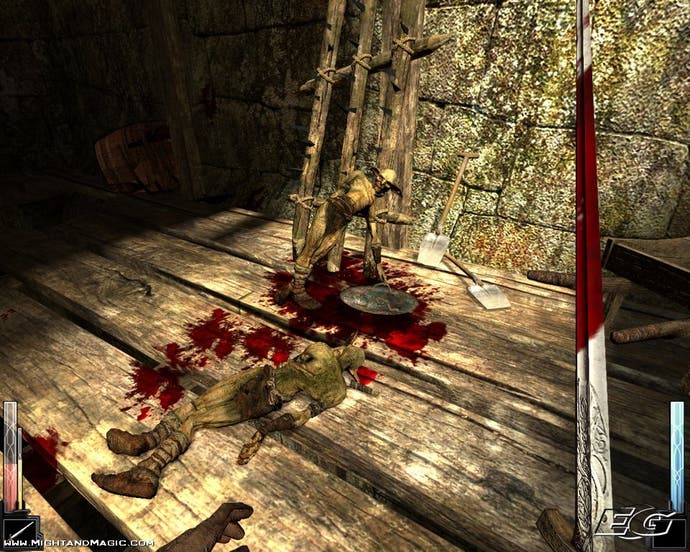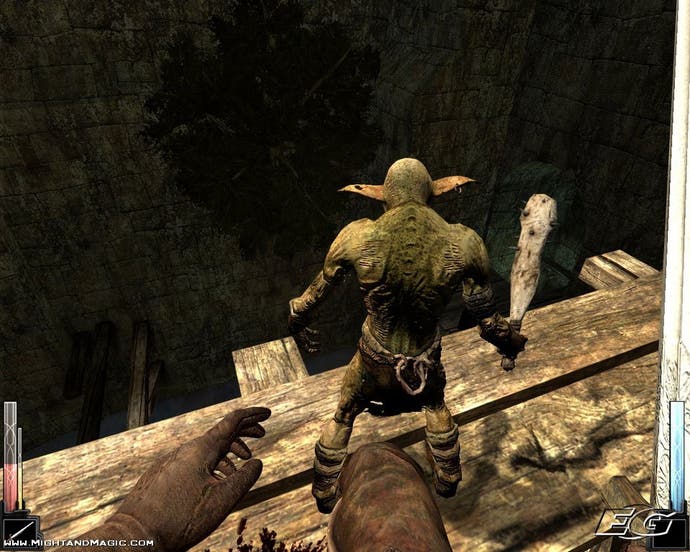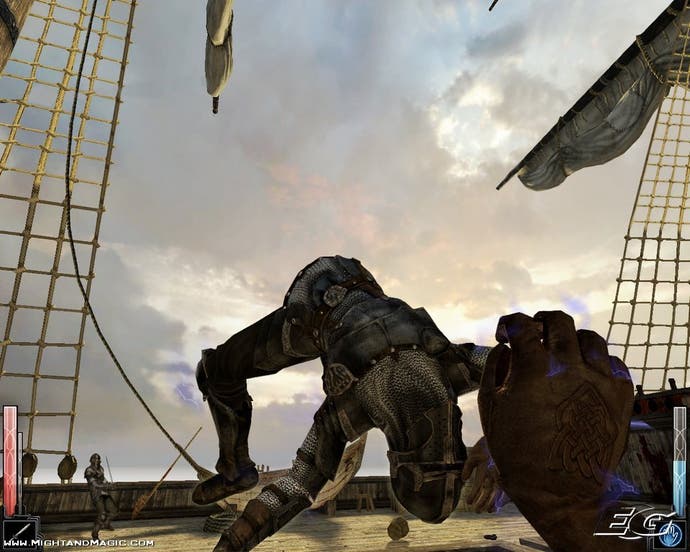Dark Messiah of Might & Magic
We turn a mirror on this Black Narcissus.
Arkane's Lyon Headquarters. We're looking at a videogame and wondering how on Earth we're still having to go all the way back to Heretic in the early nineties to think of a first-person action game in a fantasy setting. Bloody developers.
Except that's what Dark Messiah of Might and Magic actually is: a first-person fantasy action game. Ignore the name. There's a suspicion that, at least to most of the European audience, the Might and Magic name will be its biggest problem to overcome. While this comes from the developer of first-person RPG Arx Fatalis, and in fact its prehistory actually was in a sequel to that most cheery of Ultima-Underworld clones, this is very much an action game; so that's all the devotees of the turn-based Heroes of Might and Magic and first-person square-'em-up trad-RPG Might and Magic alienated. And by sticking "Might and Magic" on the box, that's something someone who just wants to put an axe deeply inside someone's head turned away. There's a marketing person somewhere connected with this who believes that any brand's a good brand. I'm not convinced it's going to be true.
On first glance, you'll file this alongside Oblivion - but that really couldn't be further from the mark. For example, while the basics of the melee combat system are identical, with a left-click performing a basic attack and a right-click applying a block, it rapidly expands further. While the last few years have been good ones for getting first-person melee to a better level (with Riddick and F.E.A.R.), this could be the one to allow a little more sophistication. At the least, the finishing moves where you can push a sword through someone before applying your boot to their chest to drag it clear are suitably visceral.

They're also getting Newtonian on the world's ass. Built with Valve's Source engine, it's a showcase for the sorts of things that you can do with the game world. Hell, the sight of what happens when you apply the kick to send a character sprawling into a spiked grill should give you a clue. The environment is packed full of things to interact with, like pillars you can topple to crush things beneath them. This can include you, too, as the AI is smart enough to notice and utilise environmental objects. The physics carries across into the magic system, with spells adding an icy sheen to the floor and sending the opposition flying - usually off a cliff. Oh yes, the magic system. It's one of those multi-routing games, with you being able to develop magic, melee and stealth skills as you progress throughout the game, as well as collect equipment and even do a little crafting. While this is a strictly level-based game, it's more than just a pretty face with a good hacking arm.
"We have so many mechanics," notes lead level designer and sound director Christophe Carrier in a tone somewhere between open lament and exultation. "You never know what's going to happen after you trigger a situation. It could go in so many different ways. You never know what's going to happen. You make barrels flammable... it's crazy. The barrels will roll and light something over here and create this chain reaction. It's cool, but it's a nightmare to tune."

Dark Messiah is, essentially, a deeply system-rich game. "For the type of game we're making, this is the way games should be," Cristophe argues, "You should provide tools to the player, and they provide their own experience with all these tools. I think if the player has the idea to do something, they should be able to do it - at the very least the action should do something. I hate the games where you have a switch on the wall and when you try to use it... nothing happens."
Meanwhile, far away from Lyon, the multiplayer is being constructed. It's not because Arkane is the Mr Tickle of videogames development with extraordinary long programming arms, but rather that in the increasing fashion of the modern age the player-on-player action is being dealt with by another developer. Which makes sense, because - y'know - they're always different games anyway.
The task belongs to Kuju, which is offering something a little more ambitious than four deathmatch levels and a capture the flag (though more basic deathmatch will be included). Essentially, it's a Team-Fortress style class game, married to some role-playing elements played across a string of Unreal-Tournament-style Assault maps. Except that's not very "essentially" at all. Explanation time.

The game is played across five maps, like a tug-of-war inversed. Starting at the centre one, a win or loss pushes the team one step back along the geographically-linked maps. That team loses again, and it's another step back to the final stronghold. A loss there loses the match. Of course, if one wins, it pushes back in the other direction. Played between Human and Undead teams, the final human fortress is shown off, where the defenders look down from sky-high crenulations and the attackers can push elaborate siege towers against the walls to gain access. The armies are comprised of five inter-supporting classes. For example, the human team consists of the Archer (sniper), Knight (melee warrior), Mage (offensive spells), Assassin (the stealth character, who mixes invisibility with similar disguise-self roles to Team Fotresses' spy) and the Priestess, who does healing-style group support. Germaine Greer wouldn't be impressed. You may as well have just had the only female character doing the washing up or something. But putting aside irrelevant knee-jerk sexual political statements for a second, each has varying abilities which are opened up by gaining experience points across the whole campaign. Which sounds pretty natty. Germaine would like that.
Enough Feminism. Extremely interesting sounding single-player mixing some of the lessons of Looking Glass and Ion Storm in a really pop, aggressive format with a solid sounding multiplayer game? That sounds like the sort of thing we should be paying attention too, doesn't it?
Yes.
It does.


